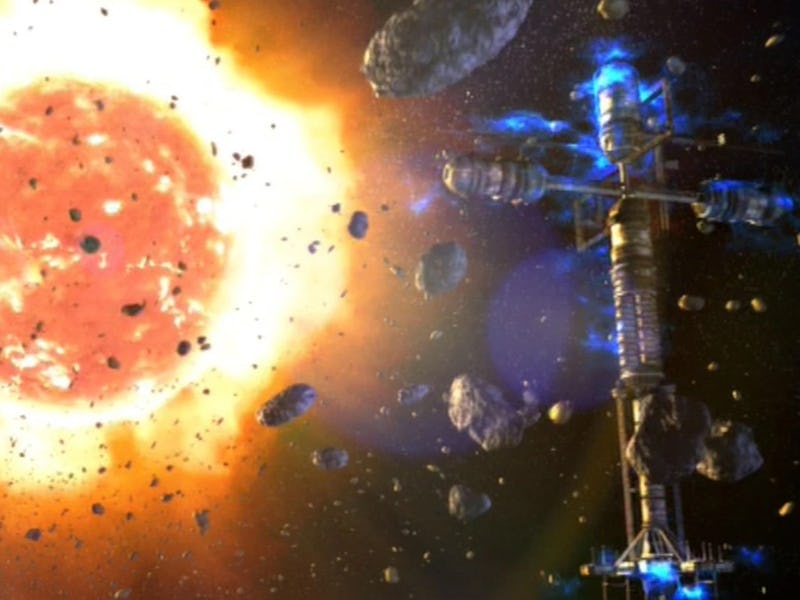Modern Doctor Who’s Crucial Early Episode Is Darker Than You Remember
Let's talk about "The End of the World."

What happens when you travel in time so far into the future that you can’t recognize the world anymore? It's a question central to the earliest science fiction stories about time travel, including much of the novel The Time Machine, the H.G. Wells classic that launched an entire genre. Certain time travel stories are only interesting if they’re deeply personal. This is why we love Back to the Future and a huge portion of Doctor Who. But what about when the scope is massive? What does that do to our perceptions of life, the universe, and everything?
Twenty years ago, after having just rebooted for the 21st century, Doctor Who tackled the big time-travel questions in the second episode of its then, newly-minted, “Season 1.” And now, looking back on this pivotal episode, it feels dark and way ahead of its time. Here’s why Doctor Who’s “The End of the World” still holds up. Spoilers ahead.
After the relatively goofy but grounded first episode, “Rose,” the 9th Doctor (Christopher Eccleston) gives his new companion (Billie Piper) a choice: forward or backward? Rose chooses to go forward, which leads to the Doctor showing off a bit. Instead of just a few hundred or a few thousand years, he takes her to the final day of the planet Earth, well over 5 billion years into the future.
Once there, the Doctor and Rose settle in on Platform One, where various alien species have gathered to watch the Earth burn. This is Who’s moment to do a kind of Star Wars cantina, the aliens are blue, or living trees, or strange fantasy creatures, or in the case of two memorable reoccurring characters, a disembodied head known as the Face of Boe and a human being named Cassandra, who is really just a sheet of skin with eyes. Anachronisms abound, with the gathered aliens believing that a jukebox is an “iPod” and that playing “Toxic” by Brittany Spears is the perfect tribute to all of Earth’s art and culture. (Perhaps not too far off there.)
Most Who fans probably remember this episode as a kind of litmus test for the newer audience; sure the new Doctor was a little tougher, and the show more contemporary, but with this setting, and this collection of creatures, you could easily imagine yourself in an episode from classic eras Tom Baker or Peter Davison in the 1970s. If Russell T Davies and company were going for realism with this episode, it certainly doesn’t show.
Rose (Billie Piper) and the Doctor (Christopher Eccleston) watch he literal end of the world.
But all the hyperbolic Who-ness of the episode belies the show’s hidden darkness. The Doctor thinks he’s taking Rose on a fun trip, but his sense of humor is slightly deranged. Nearly everything about this far future is depressing to Rose, including the fact that the so-called “Last Human” turns out to be an image-obsessed villain who only cares about offing people to make a buck. Traveling into the distant future sounds incredible at first, but then, as Rose realizes that everyone she’s ever known is dead and utterly forgotten, the enormity of time is presented as a kind of anti-catharsis.
Yes, the Doctor comforts Rose a bit, fixing her phone to allow her to call her mother, but he’s grumpy about her reaction. From his point of view, this should give her perspective about why life is fleeting and worth living, but really, in bringing Rose to the literal end of the world, the Doctor’s view on eternity comes across as flippant and arrogant. This, it would seem, is a realistic take on how a Time Lord might act if such a thing were real. Perhaps unintentionally, the Doctor seems to have shades of Q from Star Trek: The Next Generation in this episode — someone who wants to show a mortal the wonders of the universe, but ends up coming across as scary, and then gets mad about how nobody gets their awesomeness.
But it's in this theme where the episode gets sneakily even smarter. The Doctor is cranky because it's here that we first learn that he is the Last of the Time Lords. The episode introduces a ton of other canon somewhat quickly (perhaps most notably, the very-useful Psychic Paper), but the notion that the Doctor is the only Time Lord left and that Gallifrey has been destroyed is one of the most seismic things that has ever happened in Doctor Who.
Rose (Billie Piper) and the Doctor (Christopher Eccleston) in “The End of the World.” This moment totally captures their relationship at this point.
Obviously, the show would go on to grapple with this idea both thematically and literally for years to come. And yet, with all the ways the Doctor’s survival of his race has been explored since then, it never got much better than this episode. The Doctor took Rose to see the end of the Earth because he was still depressed about the end of his planet, a shocking idea that no human could ever imagine. And, so, in a weird, almost creepy move, he wanted to make her as depressed as he was.
This isn’t yet the utterly optimistic Doctor we would come to love by the time David Tennant took over. This episode represents a damaged and flawed hero. Yes, the Doctor saves the day in the end of “The End of the World,” but the episode concludes with you both feeling sorry for him and fearing him at the same time. From this point on, Doctor Who made the Doctor into a new type of character — a dark, strange person, full of contradictions. After “The End of the World,” there was no going back.